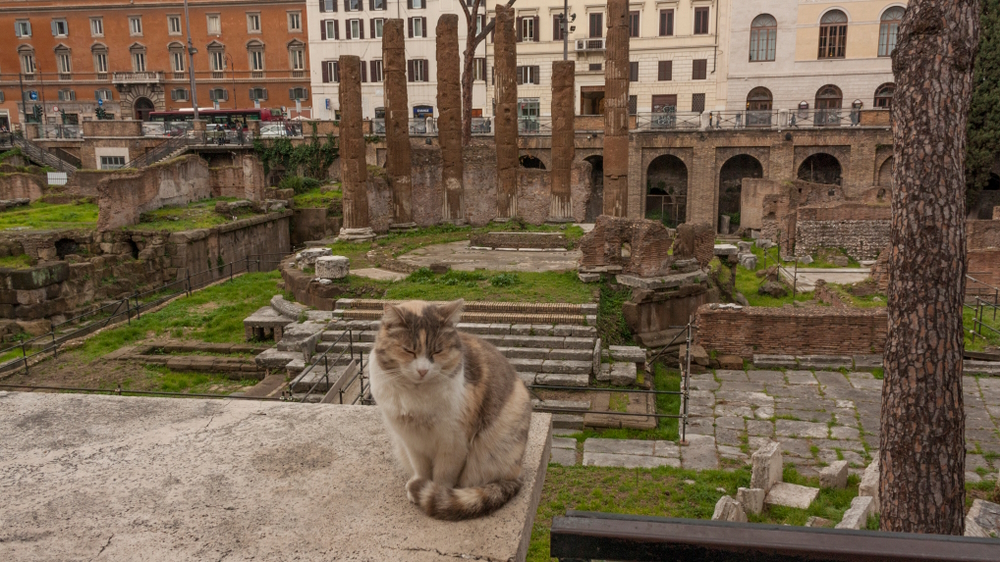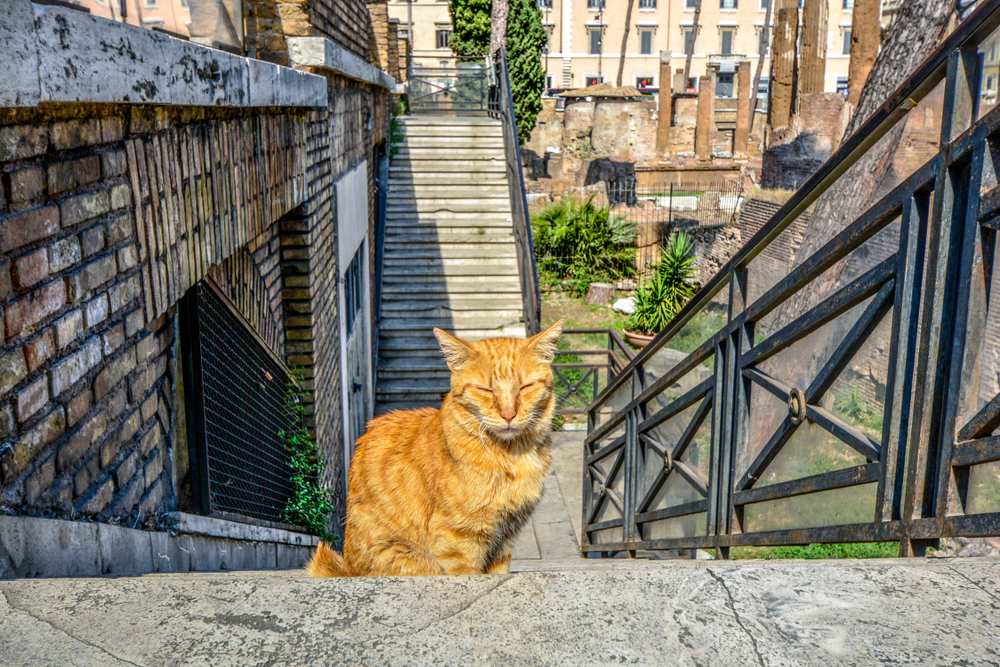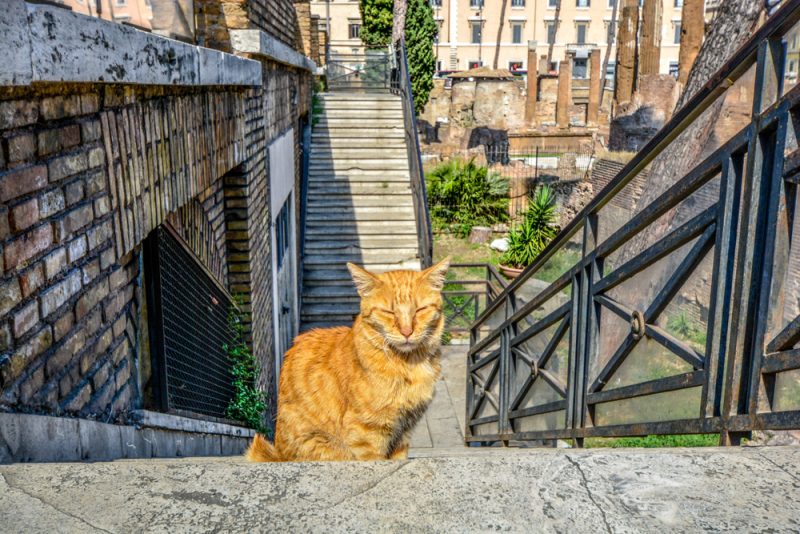Click to Skip Ahead
Torre Argentina Cat Sanctuary provides homes for feral cats in the center of Rome. It’s located on the Largo di Torre, Argentina, an archaeological site with four Roman temples. It includes the location where Julius Caesar met his demise at the hands of Marcus Junius Brutis and friends back on the Ides of March in 44 BCE.
The shelter, which can house more than 90 cats, is built on the foundation of one of the temples. All cats in the sanctuary are spayed or neutered, vaccinated, and cared for.
When Was the Site Excavated?
The site’s archaeological treasures first came to light in the 1920s when workers tearing down buildings in the area came upon the colossal head of the goddess Fortune.
The location’s future remained unclear for a few years since the owners wanted to continue as planned while the Ministry of Fine Arts fought for the area to be preserved as an archaeological site. Excavations were eventually completed in the late 1920s, and the cats moved in soon afterward. The archaeological site is about 20 feet below street level.

How Did the Sanctuary Get Started?
After the excavations were completed (and the cats moved in), local women (known as “gattare”) began feeding them, which lasted until the 1990s, when the shelter officially came into existence.
Silvia Viviani and Lia Dequel, the shelter’s founders, often had to approach tourists to ask for donations to pay for the cats’ care. People responded enthusiastically and even started offering to volunteer. Donations started to increase as volunteers began engaging in fundraising activities.
There was a problem in the early 2010s when archaeological authorities attempted to evict the shelter due to its location in a protected heritage area. The site can be viewed from the street level or on wheelchair-accessible walkways, allowing visitors to get better views of the archaeological treasures.
History of Torre Argentina: What’s On the Site?
Torre Argentina is an incredibly rich archaeological site that’s dripping with history. It’s home to four temples— A, B, C, and D— that were built during the Roman Republic. It also contains the ruins of the Curia of Pompey, where the Senate often met to do business.
Temple D, the original shelter site, hasn’t been fully excavated, and scholars aren’t entirely sure to whom it was dedicated. Identifying the goddesses who belong to temples A and C has been challenging for scholars; both could be dedicated to Juturna or Feronia. Temple B was dedicated to Fortuna Huiusce Diei, or Today’s Luck, an iteration of the goddess Fortuna.
How Did Cats First Arrive in Rome?
Cats likely made their way to Rome from Egypt after the area became a Roman province in 30 BCE. By the time Rome incorporated the area into its possessions, cats had long been a core part of Egyptian society.
Cats spread throughout Europe as Rome expanded, and traders who brought them on board for rodent control introduced them to port cities around the Mediterranean.

How Did Egypt Become Part of the Roman Empire?
It all began in the 4th century BCE, when Alexander the Great of Macedonia conquered vast swaths of land, including parts of Asia Minor, Phoenicia, Syria, Mesopotamia, and Persia.
Alexander conquered Egypt (which was under Persian control at the time) in 332 BCE. Alexander and his troops even reached parts of Afghanistan and Northern India. After reaching the banks of the Hyphasis River (in India), Alexander’s troops, tired of campaigning, refused to go further and demanded to return home.
It was on this journey back to Macedonia that Alexander died rather suddenly at the age of 33 in Babylon in 323 BCE. Unfortunately, Alexander didn’t appoint a successor, which resulted in the fragmentation of his empire (after a fair bit of violence) into the hands of various generals who had gone to war with him and who established hereditary kingdoms in the lands they controlled.
The Selucids controlled Mesopotamia, parts of Asia Minor, Afghanistan, and Syria, while the Ptolemies became the rulers of Egypt. The Hellenistic kingdoms that emerged after Alexander’s death lasted hundreds of years. Frequent dynastic intrigue amongst the Ptolemies also weakened the kingdom, and the tradition of familial intermarriage didn’t help.
Eventually, the Ptolemies were forced to turn to Rome for support. Things came to a head at the Battle of Actium, an epic naval encounter during which Octavian defeated Mark Antony (who was getting help from Cleopatra). Cleopatra and Antony fled during the battle, and the pair ended up in Egypt. Octavian went to North Africa and laid siege to Alexandria, where Antony and Cleopatra were holed up.
Antony and Cleopatra both died by suicide, leaving Octavian the most powerful man in the Roman world. Egypt became a Roman province in 30 BCE. Octavian would officially be named Augustus by senatorial proclamation in 27 BCE as the Roman Republic transformed into a dynamic, expansive empire that would dominate large parts of Europe and the Mediterranean world.

Frequently Asked Questions (FAQ)
Are There Ways to Support the Shelter if You Can’t Make It to Rome?
Absolutely! The sanctuary has an Adoptions at a Distance program through which donors can help support the cats and their care. Adopters also receive regular updates on the shelter cats’ activities.
Have Any Famous People Helped Care for The Cats?
Yes. Film star Anna Magnani regularly brought food to the Torre Argentina cats. Silvia Viviani, one of the shelter’s founders, was a professional opera singer before retiring.
Is The Shelter a No-Kill Sanctuary?
Torre Argentina Cat Sanctuary is a no-kill shelter, and the volunteers make every effort possible to ensure adoptable cats and kittens find loving homes. It even has a program dedicated to fostering kittens, which gives the baby cats who end up in their care the best possible chances at finding forever families.
Conclusion
Torre Argentina Cat Sanctuary provides homes for feral cats in Rome. Part of what makes the shelter so interesting is its location amongst the Largo di Torre Argentina archaeological ruins, which features four Roman Republican Temples and parts of the Curia of Pompey, where Julius Caesar was assassinated.
The shelter ensures that all cats who call it home are spayed or neutered and receive medical care. It also tries to help as many cats as possible get adopted. Torre Argentina also runs a socialization program to help abandoned baby cats get loving starts in life.
Featured Image Credit: Kirk Fisher, Shutterstock










